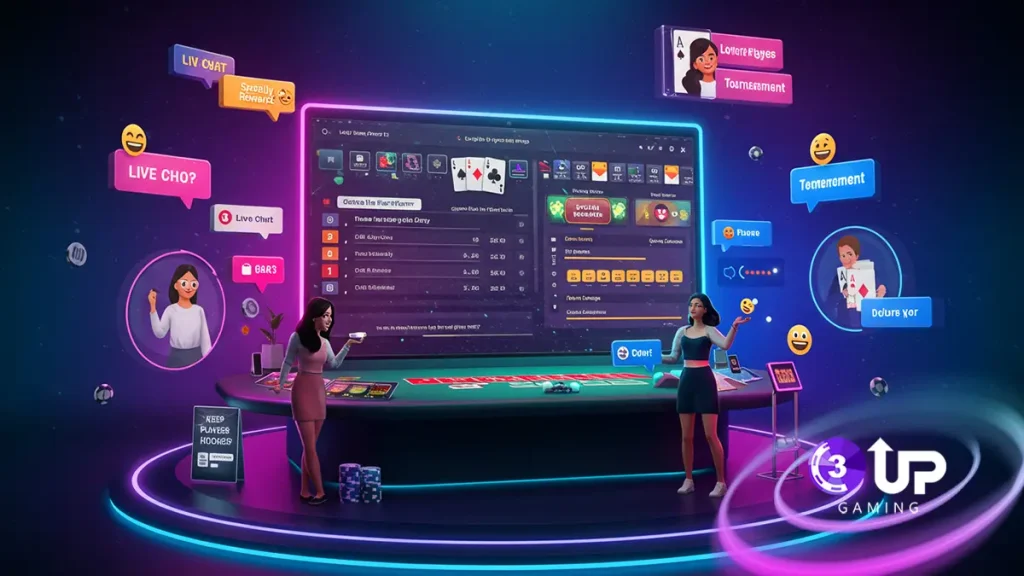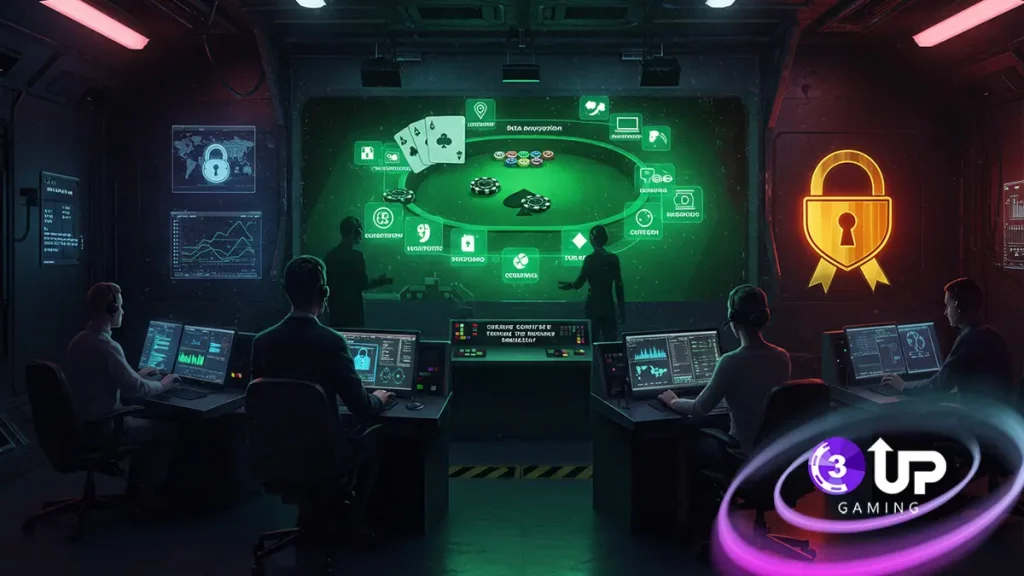Turnkey vs. Open-Source Poker Software: What’s Better for You? Choosing between turnkey and open-source poker software depends on your technical expertise, budget, and business goals. Turnkey poker software is a ready-made, fully developed solution that allows you to launch your poker platform quickly. It includes everything from game logic and user interface to payment integration and customer support tools. This is ideal for entrepreneurs who want a fast, hassle-free entry into the market without needing in-depth technical knowledge. Turnkey solutions also come with regular updates and security patches, making them a safe and efficient choice for scaling your business.
Turnkey vs. Open-Source Poker Software
On the other hand, open-source poker software offers more flexibility and control. With access to the source code, you or your development team can modify and customize the platform to fit your exact needs. This option is better suited for companies with strong technical resources and a desire to create a unique poker experience. However, open-source software often requires more time, ongoing maintenance, and higher initial setup costs. Ultimately, if speed and simplicity are your priorities, go with turnkey. If customization and control matter more, open-source may be the better route.
Thinking of launching an online poker platform? Starting an online poker platform is a thrilling journey. With the global online gambling market set to surpass $100 billion by 2026, the stakes are high, and so are the rewards.
Your first big choice? Picking the right software to power your platform. This decision shapes everything from launch speed to player satisfaction. Let’s dive into the two main options: turnkey and open-source poker software. Each has its strengths and quirks, and I’m here to break them down clearly, so you can choose what’s best for your goals.
Overview: Turnkey vs. Open-Source Poker Software

Kicking off an online poker platform starts with a crucial choice: the software that’ll run your games. Turnkey poker software is like a ready-to-go package, letting you hit the ground running. Open-source, on the other hand, hands you the raw code to shape as you see fit.
This choice affects your timeline, budget, and how flexible your platform can be. I’ve seen businesses thrive by picking the right fit early on. Let’s set the stage for what each option brings to the table.
What Is Turnkey Poker Software? Pros and Cons
Turnkey poker software is like buying a fully furnished house, you can move in right away. It’s a complete package, bundling game engines, payment systems, and tools to manage players. Providers build these systems for quick launches, handling most of the techy stuff like updates and maintenance.
The catch? You get less room to tweak things. You’re often stuck with the provider’s features, which can make it tricky to stand out with a unique vibe. Let’s weigh the ups and downs.
Advantages of Turnkey Solutions
Turnkey solutions shine when it comes to simplicity and speed. You can get your poker platform up and running way faster than building from scratch. This quick turnaround is gold for jumping on market trends. Plus, the provider takes care of ongoing maintenance and support.
Your team can focus on what matters, bringing in players and growing your brand. For businesses short on tech skills, this hands-off approach is a lifesaver, letting you zero in on expansion.
Disadvantages of Turnkey Solutions
The biggest hiccup with turnkey software is its limited customization. You’re tied to the provider’s templates, which can make your platform feel a bit cookie-cutter. If you’ve got a bold vision, this can be frustrating.
Upfront licensing fees can sting, and ongoing costs like subscriptions add up. Also, switching providers later? That’s a headache, often pricey and complex. Picking the right provider from the start is key.
What Is Open-Source Poker Software? Pros and Cons
Open-source poker software takes a different route. Instead of a finished product, you get the core code, think blueprints and materials to build your dream house. You’ve got total control to mold every detail, from visuals to gameplay.
This freedom lets you craft a platform that’s uniquely yours. But it comes with a catch: you’re on the hook for building, maintaining, and securing it all. Let’s unpack the pros and cons.
Advantages of Open-Source Solutions
Open-source poker software gives you unmatched control and flexibility. You can shape a platform that screams your brand, packed with one-of-a-kind features. It’s perfect for sparking innovation and keeping up with player demands. Best part? No licensing fees, which can save big if you’ve got tech know-how.
The open-source community is a treasure trove of resources, forums, guides, and shared fixes. I’ve seen teams tap into this support to solve tricky problems fast.
Disadvantages of Open-Source Solut
Open-source software demands serious tech skills and patience. You’ll need a talented team to build and maintain your platform, which means hefty upfront costs and ongoing expenses for developers.
It also takes way longer to launch than turnkey options, as you’re crafting everything from scratch. Security’s on you too, without tight measures, your platform could be at risk, which is a dealbreaker in gaming.
Cost Comparison: Upfront Investment vs. Ongoing Development

Figuring out the budget for your poker platform goes beyond the sticker price. You’ve got to think about the full cost picture, upfront fees, maintenance, and future tweaks. This helps you pick a model that fits your wallet and long-term plans.
Turnkey systems mean paying for a polished product and steady support. Open-source leans hard on development and tech management costs. Here’s how they stack up.
Table: Cost Comparison of Poker Software
| Feature | Turnkey Poker Software | Open-Source Poker Software |
| Upfront Cost | Higher initial licensing/setup fees | Lower initial licensing fees, higher development costs |
| Ongoing Costs | Recurring licensing, maintenance fees | Developer salaries, infrastructure costs |
| Time to Market | Faster deployment, quicker launch | Slower due to extensive development |
| Customization | Limited, relies on provider’s offerings | Unlimited, full control over every aspect |
| Technical Support | Provided by vendor, included in fees | Self-supported or community-based |
| Security | Managed by vendor, robust features | Your responsibility, requires expertise |
Customization Options: Which Model Offers More Flexibility?
Making your poker platform stand out is all about customization. In a crowded gaming world, a unique look and feel can hook players. Turnkey and open-source systems offer wildly different levels of flexibility, affecting how much you can innovate.
Your brand’s style and special features are what make you memorable. A platform I saw with custom tournaments kept players coming back. Let’s see which option gives you more creative freedom.
Branding and Design Control
Turnkey poker software lets you tweak some branding, like logos and colors, but you’re locked into preset templates. Big structural changes? Usually off the table. It’s fine if you want a sharp, professional look without much design work.
Open-source software hands you the keys to every visual detail. You can reshape the entire interface, creating a standout experience that’s all your own. It’s a game-changer for bold brands.
Feature Set and Integration Capabilities
With turnkey systems, the provider decides your features. You’ll get solid basics like tournaments and payments, but niche integrations or unique functions might be out of reach.
Open-source platforms let you add any feature you dream up, think custom game modes or special rewards. You can tie in any third-party tool, but it depends on your team’s skills and budget.
Time to Launch: Speed vs. Control in Development
Getting your poker platform live fast can give you an edge, especially in a hot market. But speed often means giving up some control. Turnkey and open-source systems strike different balances here.
A quick launch can beat competitors to the punch, but rushing might limit your vision. I’ve seen startups nail this by prioritizing what matters most. Let’s compare the two paths.
Technical Requirements and Support Availability
Running a poker platform isn’t just about games, it’s a tech-heavy operation. Turnkey and open-source systems have different technical demands and support setups, which can make or break your operations.
Good support keeps things running smoothly. I once saw a platform avoid disaster thanks to quick vendor help. Knowing what each model requires helps you plan your team’s role.
Security and Compliance: Which Is More Reliable?

Security and compliance are non-negotiable in online gaming. Players need to trust your platform, and regulators demand strict adherence to rules. Turnkey and open-source handle these differently, each with its own strengths.
A single slip-up can tank your reputation. Both systems can work, but the responsibility varies. Here’s how they measure up in keeping your platform safe and legal.
Table: Security and Compliance Comparison
| Aspect | Turnkey Poker Software | Open-Source Poker Software |
| Responsibility | Primarily vendor’s responsibility | Primarily your responsibility |
| Expertise Needed | Minimal for operators | High, requires dedicated security team |
| Updates | Handled by vendor, often automatic | Manual implementation by your team |
| Fraud Detection | Built-in sophisticated systems | Requires custom development |
| Compliance Support | Pre-built features, vendor guidance | Requires custom development |
Scalability and Long-Term Maintenance Considerations
As your poker platform grows, it needs to handle more players without hiccups. Long-term maintenance keeps it fresh and competitive. Here’s what to consider:
- Can your system manage a player surge without crashing? It’s about the software’s core design, not just servers.
- Keeping up with tech trends means integrating new features. Staying current is vital.
- Maintenance costs pile up, bug fixes and upgrades aren’t cheap. Plan for the long haul.
Choosing the Right Model Based on Your Business Goals
Picking between turnkey and open-source poker software isn’t about “better”, it’s about what fits your vision. Your goals, resources, and appetite for risk steer this choice. There’s no one-size-fits-all.
The best platforms I’ve seen match their tech to their strategy. Let’s figure out which model aligns with where you’re headed and what you’re ready to tackle.
When Turnkey is Your Best Bet
Turnkey poker software is your go-to if you want to launch fast with minimal tech hassle. It’s perfect for startups or businesses testing the waters. If your team’s light on developers, this keeps you focused on marketing and players.
A small platform I worked with used turnkey to get live in weeks, grabbing early traction. It’s all about speed and simplicity.
When Open-Source Shines
Open-source poker software is ideal if you crave total control and a unique platform. It suits businesses with big ideas and the tech muscle to back them up. You can build something truly special.
With a strong dev team, open-source lets you innovate freely. A gaming company I know used it to create exclusive game modes, setting them apart.
Player Engagement Strategies
Keeping players hooked is what makes a poker platform thrive. Customization plays a huge role here, and turnkey versus open-source systems shape how you engage your audience.
Unique features, like special tournaments, can build loyalty. I’ve seen platforms with tailored designs keep players longer. Let’s explore how each model supports engagement.
Payment System Integration
Seamless payments are a must for any poker platform. Turnkey systems offer preset options, while open-source lets you craft custom solutions. Both impact how players fund their games.
Getting payments right builds trust. I once saw a platform lose players over clunky transactions. Each model handles this differently, affecting your operations.
Social and Multiplayer Features
Multiplayer modes and social tools, like chat or leaderboards, make poker platforms lively. Turnkey systems provide ready-made options, while open-source lets you design unique interactions.
Community features keep players engaged. A platform I followed boosted retention with custom social tools. Let’s see how each model supports these connections.
Mobile Accessibility and Compatibility
Today’s players expect poker platforms to work flawlessly on phones, tablets, and desktops. Turnkey and open-source systems approach mobile access differently, impacting your reach.
I’ve seen platforms struggle without strong mobile support. Ensuring compatibility across devices is key to keeping players happy and active.
Global Regulatory Compliance

Staying legal in online gaming means navigating a web of global regulations. Turnkey and open-source systems handle compliance in distinct ways, affecting your ability to operate worldwide.
Compliance slip-ups can shut you down. I’ve seen platforms pivot fast to meet new rules. Let’s look at how each model keeps you on the right side of the law.
Developer and Community Support
Support keeps your poker platform running smoothly. Turnkey systems rely on vendor help, while open-source leans on community resources or hired experts. Each has its perks.
Quick support can save the day. A platform I know avoided downtime thanks to solid vendor backup. Let’s compare how each model delivers help when you need it.
Platform Innovation and Trends
Staying ahead in online poker means embracing new tech, like VR or AI-driven features. Turnkey systems may lag unless providers prioritize updates, while open-source lets you jump on trends fast.
Innovation keeps you competitive. I’ve seen platforms wow players with cutting-edge tools. Let’s explore how each model supports forward-thinking ideas.
Marketing Tools for Player Acquisition
Drawing in players takes smart marketing. Turnkey systems often include built-in tools, while open-source lets you craft custom campaigns. Both shape how you grow your audience.
A platform I followed doubled sign-ups with sharp promotions. Let’s see how each model equips you to attract and keep players.
Revenue and Monetization Models
Turning a profit is the endgame for any poker platform. Turnkey systems offer standard revenue models, while open-source allows tailored strategies, like unique subscriptions or fees.
Smart monetization fuels growth. I’ve seen platforms thrive by mixing creative revenue streams. Let’s compare how each model supports your bottom line.
Quality Assurance and Testing
A glitch-free poker platform builds trust. Turnkey systems come pre-tested, while open-source requires your team to handle quality checks. Both affect player satisfaction.
I’ve seen bugs tank a platform’s launch. Rigorous testing is non-negotiable, so let’s look at how each model ensures a smooth experience.
Conclusion:
Choosing between turnkey and open-source poker software sets the course for your platform’s future. Here’s the rundown to guide your decision:
- Turnkey offers speed and ease, perfect for quick launches with less tech know-how.
- Open-source delivers total control and innovation, ideal for unique platforms with strong teams.
- Your goals, speed versus customization, shape the best pick.
- Costs, security, and scalability all play a role in your choice.
- Weigh your needs carefully to land on the system that’ll drive your success.
FAQ
What is the main difference between turnkey and open-source poker software?
Turnkey is a ready-to-use system with vendor support. Open-source provides core code for customization, requiring your own development and maintenance.
Which one is better for a beginner launching a poker platform?
Turnkey software is generally better for beginners. It simplifies technical setup and speeds up launch, allowing you to focus on business growth.
Can I customize turnkey poker software easily?
Customization is limited to branding like logos. Extensive changes to core features are generally not possible.
Is open-source poker software really free?
The core code is often free. However, significant costs arise from development, infrastructure, maintenance, and security.
Which model is more secure against cheating and fraud?
Both can be secure. Turnkey providers offer built-in security. With open-source, you are fully responsible for implementing and managing all security yourself.


